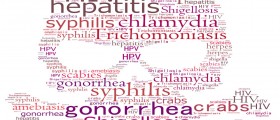
Chlamydia can cause symptoms or can also be asymptomatic and usually occurs within 7-14 days after being exposed. Women may have a range of symptoms which may include vaginal discharge, painful intercourse, and a burning sensation during urination and if the infection spreads into the reproductive organs, it can lead to lower abdominal pain, fever, bleeding between menstrual cycles and in severe cases, infertility can result. For men that have Chlamydia, it can lead to painful urination, uncomfortable sexual intercourse and discharge from the tip of the penis.
When a couple is trying to conceive a baby and one or the other has a Chlamydia infection that has not been treated, it can result in difficulty becoming pregnant. When Chlamydia infection is suspected, there are a number of tests which can be done to make a definitive diagnosis such as a blood test or genital swab. The longer the infection is allowed to go without treatment, the more of a chance there is that Chlamydia infection and infertility will keep a couple from being able to conceive. While Chlamydia is one of the most common forms of sexually transmitted diseases, it can also be treated and completely cured with a simple round of antibiotics. Once an infection has been diagnosed, the couple will both need to be treated and abstain from sexual intercourse until after treatment has been completed.
Having multiple infections due to Chlamydia can increase a couples chances of infertility and difficulty when trying to become pregnant. Chlamydia infection and infertility go hand in hand, but with early diagnosis and treatment it does not have to put an end to a couple's dream of trying to conceive and have a baby.

















Your thoughts on this
Loading...